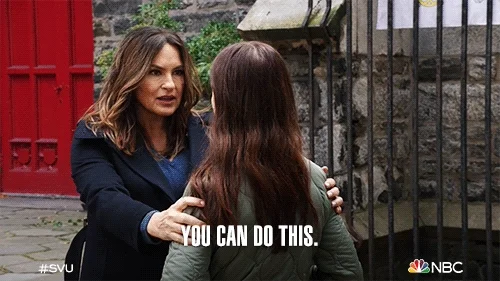
This logo isn't an ad or affiliate link. It's an organization that shares in our mission, and empowered the authors to share their insights in Byte form.
Rumie vets Bytes for compliance with our
Standards.
The organization is responsible for the completeness and reliability of the content.
Learn more
about how Rumie works with partners.
You've got a lot on your mind to share and you're not sure where to start.
It's not an easy topic to talk about so it's overwhelming.

You might want to disclose some sensitive information to your partner:
I called in sick today and didn't go to class. I stayed home to play video games and haven't done any of my coursework. This is because I was diagnosed with persistent depressive disorder. I didn't really want to tell you because I don't want to drag you into my problems.
Or maybe you're frustrated with them:
I always have to do the dishes and clean the kitchen after our meals. Every day I'm just cleaning up! The work never ends and I don't like to feel this way. You don't offer to help anything, like putting the garbage away, and after dinner, I'm always cleaning up by myself.
No matter what the situation, these 3 steps on how to communicate better in a relationship will help you find effective ways to communicate with your partner when times are tough.
Step 1: Prepare for the conversation
 Photo by Kenny Eliason on Unsplash
Photo by Kenny Eliason on UnsplashEven if you feel that it won't be worth it, it'll prepare you more than you think!
Just remember to:
Share facts — discuss only the important information they need to know
Keep it simple — you don't want to lose the listener
Open the conversation on a regular day when you both have the time and mental space to talk — avoid "non-routine" times like holidays, parties, vacations, or stressful periods
Jot down a few responses as bullet points for each of the following questions. It'll help you prepare for the conversation with your partner:
What am I struggling with?
What am I doing about it right now?
What do I need from my partner?
Why do I need this from my partner?
Step 2: Open the conversation
 Photo by LinkedIn Sales Solutions on Unsplash
Photo by LinkedIn Sales Solutions on Unsplash Use different opening statements depending on the situation.
Use different opening statements depending on the situation.
You and your partner are lounging around on a weekend afternoon:
Hey, I have something quick I want to talk to you about. Is now a good time to talk about it?
Today wasn't a good day to chat so you set the scene for another time:
Hey, can we walk the dog together tomorrow? I have something I want to share with you. Nothing to worry about, but wanted to talk to you about it.
You're away from home but you want to share something so you text:
Hi, I have something I want to talk to you about. Nothing urgent or anything but can I give you a call when you're available?
Did you know?
This Byte was created by a volunteer professional that wanted to share this insight to help you succeed - no agenda, no cost.
Try it!
 Photo by Priscilla Du Preez on Unsplash
Photo by Priscilla Du Preez on UnsplashWhich is the best choice to communicate better in a relationship and open a conversation?
Option A: You and your partner just finished eating dinner at home. You say, "Hey, I'd like to share something with you, can we talk for a moment?"
Option B: You and your partner are preparing to go camping this weekend. You say, "I've been thinking about a few things that I want to share. Do you have a moment to listen?"
Option C: You and your partner are out to dinner on a weeknight. You say, "I need you to help me with the house chores. I've been cleaning too much."
Quiz
Which is the best choice how to communicate better in a relationship and open a conversation?
You want to choose a time that is part of a routine, or when not much is going on. Keep in mind as well to ease into the conversation to set boundaries and give your partner the choice to talk about it.
Step 3: State the important information
Express your thoughts to your partner, as responses to the questions in Step 1, narrowing down the bullet points to the most essential for each of the questions:
This is what I'm struggling with.
This is what I'm doing about it right now.
This is what I need from you.
This is why I need it.
 Remember:
Remember:
Share only essential facts
Keep it simple
Start the conversation on a regular day
Practice!
Take the example from the beginning of this Byte:
I called in sick today and didn't go to class. I stayed home to play video games and haven't done any of my coursework. This is because I was diagnosed with persistent depressive disorder. I didn't really want to tell you because I don't want to drag you into my problems.
How can you get your message across clearly and simply?
Option A: I stayed home today. I wasn't feeling well anyways. I think I'm feeling better but I'm not really sure. I don't want to drag you into my problems so you don't have to do anything about it if you don't want to.
Option B: I'm not feeling well, so I decided to stay home. I need you to understand that I'm going through a lot because I'm feeling really lost right now. I really need your help but I don't know what you can do.
Option C: I was diagnosed with persistent depressive disorder. My only solution is to stay home and rest when I can, especially when I get overwhelmed. I want you to know that I'm not lying, lazy, or avoiding you. If you feel up to it, I can tell you more on what support I need.
Quiz
How can you condense what you want to say simply?
Option C states important facts and answers the 4 questions to keep it simple and clear.
Take Action

This Byte has been authored by
Shawn Fan
Instructional Designer
This Byte has been reviewed by
Luc Boudreau
MSc, BSc
